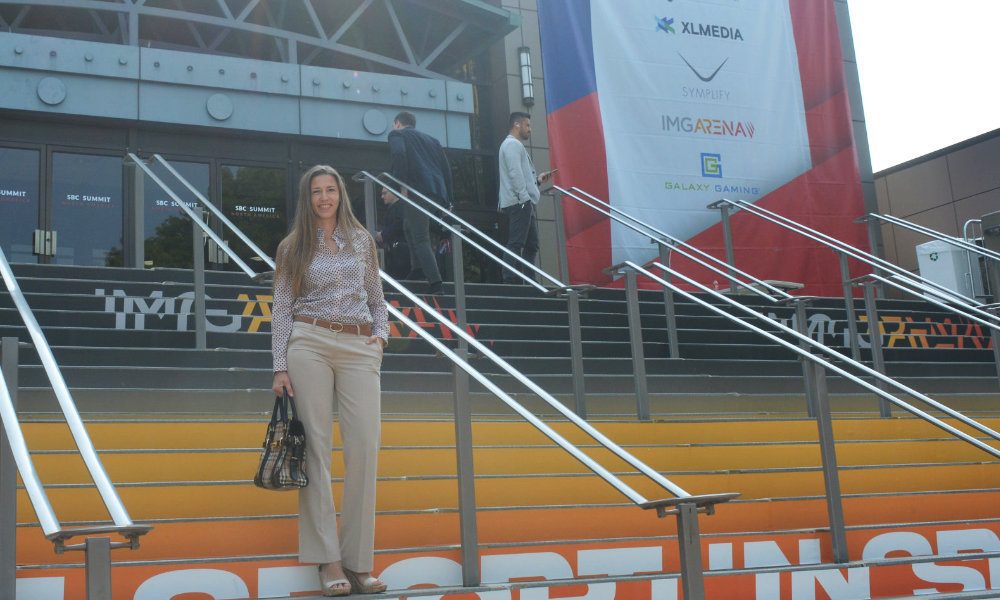Dr. Laila Mintas admits she’s not a sports fan and isn’t a gambler. “I’m a somewhat atypical German,” she says.
How then, did Mintas become an innovator and expert in the sports betting space?
“I always have been a fan of understanding data, analyzing data,” says Mintas, who has worked for the soccer organizations FIFA and Concacaf, and is currently the CEO of Play Engine, a provider of data-driven solutions for sportsbooks. “I always understood the power of data.”
Mintas is one of the gaming industry’s notable innovators, leveraging her skills to effect change. After starting her career as a lawyer for White & Case in Berlin, Germany, she’s served as FIFA’s Head of Legal and International Development, Director of Sports Integrity for Concacaf, and Sportradar’s Deputy President. She taught law at Humboldt University in Berlin, international and comparative sports law at St. John’s University in New York, and founded her own consulting company, Dr. Mintas Consulting.
“She has accumulated extensive experience across multiple companies, demonstrating remarkable adaptability and a passion for sharing those experiences as she is asked to speak at every conference,” says Dan Kustelski, CEO and Co-Founder of Chalkline Sports. “Her vast knowledge and diverse expertise have made her an invaluable asset to any organization she has been a part of. I have worked with her throughout the years and have always appreciated her ability to innovate and challenge the status quo. She consistently seeks new approaches and solutions, making her a driving force in the industry.”
Mintas was recruited by FIFA after the organization became aware of her Ph.D. Published as a book, the P.h.D. contested Germany’s refusal to let private sports betting operators do business in the country – a situation that has since changed — the global soccer organization recruited her to be part of its in-house Early Warning System that looked at soccer data and compared it with betting trends, looking for irregularities.
There were, according to Mintas, World Cup games that had been manipulated, and U-15 contests where young players were approached to throw games.
“We did a lot of education, and at FIFA, we signed an agreement with Interpol, educating them about how sports betting works,” says Mintas, who conducted workshops around the world about the incursion of criminal elements into sports betting.
Mintas then moved to Concacaf, again focusing on ensuring the integrity of soccer matches.
“It was very challenging work because I recognized that oftentimes sports organizations don’t take sports integrity as seriously as they should,” she says.
Mintas moved to SportRadar to lead the U.S. business as deputy president, building a market share of 85% and a $2.6 billion valuation. She was also negotiated deals with leagues including the NFL, NBA, Major League Baseball and the NHL. She attended Super Bowls and other championship events before being named CEO of PlayUp USA, where controversy ensued.
Mintas raised $35 million from FTX, the cryptocurrency firm founded by Sam Bankman-Fried, by the end of 2021 and received an offer to acquire the U.S. business for $450 million. The offer from FTX was monumental, considering Mintas has built the operation from scratch within 24 months and with very little resources, investing in the company herself. The deal failed and Mintas was later sued by the company for allegedly sabotaging a deal, as reported by US Bets in 2021. However, according to court documents Global CEO Daniel Simic tried to package an unrelated company into FTX’s purchase along with a $25 million bonus for himself, which the filing claims is the true reason for the deal failing, and that Mintas is a scapegoat. Mintas politely declined to speak about the controversy at the advice of her attorney.
Mintas’ new venture, PlayEngine, is scheduled to launch this fall. Based in Silicon Valley and co-founded with Aram Cherkezyan, the company differentiates itself through an approach that mimics tech giants such as Google, Microsoft, and Netflix. PlayEngine uses a microservice-based architecture for its self-driving, self-monitoring, and self-repairing Genesis platform, which claims to reduce operational expenses through artificial intelligence.
Mintas notes that after the repeal of the Professional and Amateur Sports Protection Act five years ago, there was a rush to the marketplace, often without regard to improving the technology.
Bettors also have become more sophisticated and demanding since PASPA’s repeal, and PlayEngine is an attempt to meet their needs.
“Now, they want a customized, personalized experience,” Mintas says. “They want a smooth experience. If something is not working, they just switch apps. Users usually have three to five apps on their phone, and if something isn’t working, they just don’t use it anymore. You’re losing customers if you’re not providing a great user experience.
“I think the market is too competitive to have old technology. … The environment is perfect for PlayEngine, because we are putting the focus on technology first. That’s one of our differentiators.”



